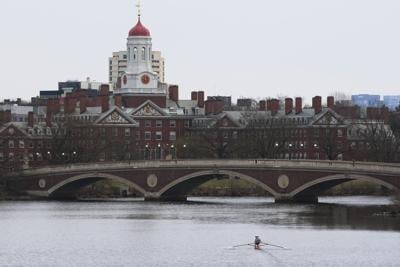WASHINGTON (AP) ŌĆö As colleges and universities pull back on diversity practices, a new poll finds that young Asian American, Native Hawaiian and Pacific Islanders are overwhelmingly against cutting federal funding for diversity, equity and inclusion programs in higher education and deporting students involved in protest activity on campus.
But opposition is lower among older groups ŌĆö despite the fact that most AAPI adults, regardless of age, place a high value on a college education.
The new survey from found that about 6 in 10 AAPI adults overall ŌĆ£somewhatŌĆØ or ŌĆ£stronglyŌĆØ oppose cutting federal funding for colleges and universities with DEI programs, and a similar share are ŌĆ£somewhatŌĆØ or ŌĆ£stronglyŌĆØ opposed to arresting or deporting foreign students involved with campus protests.
Younger AAPI adults are largely against these policies: About 9 in 10 AAPI adults under 30 ŌĆ£somewhatŌĆØ or ŌĆ£stronglyŌĆØ oppose cutting federal funds for colleges and universities with DEI policies, and a similar share are against arresting or deporting students involved with campus protests.
Older AAPI adults are more likely to oppose these moves than to favor them, but their opposition is much less overwhelming. About half of AAPI adults ages 60 and older ŌĆ£somewhatŌĆØ or ŌĆ£stronglyŌĆØ oppose cutting federal funds for DEI in higher education or arresting or deporting students for protest activity, while about 3 in 10 are ŌĆ£somewhatŌĆØ or ŌĆ£stronglyŌĆØ in favor and about 2 in 10 have a neutral view.
Despite these divisions, the survey shows that AAPI adults continue to see a college degree as critical for achieving key milestones. The vast majority, regardless of age, say a college degree is ŌĆ£essentialŌĆØ or ŌĆ£importantŌĆØ for getting a good job that can comfortably support a family.
This poll is part of exploring the views of Asian Americans, Native Hawaiians and Pacific Islanders, whose views are usually not highlighted in other surveys because of small sample sizes and lack of linguistic representation.
The Trump administration has over DEI programs, leading many colleges to support systems for students of color.
The White House already has in federal research grants to colleges it accuses of not doing enough to curb antisemitism, particularly during protests against the Israel-Hamas war. It also has moved to deport foreign students over their involvement with pro-Palestinian demonstrations, including Columbia University student .
Iris Chiou, a 28-year-old Taiwanese American medical student in Madison, Illinois, says she’s scared for foreign students who could face deportation. She wonders how long .
ŌĆ£The fact that you have people disappearing and being deported, being functionally kidnapped, I think thatŌĆÖs going to scare people ŌĆö which itŌĆÖs probably supposed to,ŌĆØ said Chiou, who is a Democrat. It will keep people from discussing ŌĆ£what they care about.ŌĆØ
Some schools have At , thereŌĆÖs now a ban on students wearing masks to hide their identities and protesters must show identification when asked. Meanwhile, has pushed back on the administrationŌĆÖs demands, filing a lawsuit in April to challenge .
Rowena Tomaneng, board chair of the Asian Pacific Americans in Higher Education, said that . ŌĆ£Definitely I think international students are feeling that the United States might not be as a welcoming environment anymore for them to pursue their studies,ŌĆØ Tomaneng said.
But younger AAPI adults are more worried about the impact on campuses. About 7 in 10 AAPI adults under 30 are ŌĆ£extremelyŌĆØ or ŌĆ£veryŌĆØ concerned about restrictions to free speech on campuses and federal government cuts to university research, compared to about half of AAPI adults ages 60 and older.
Tarun Puri, 59, of Clearwater, Florida, supports arresting or deporting international students who participated in campus protests. ŌĆ£You pay so much money to come and study. What is the point of protesting?ŌĆØ said Puri, a registered Republican who was born in India and went to college there. ŌĆ£Because you go to another country you should respect the law and order of the country.ŌĆØ
If he had a child in college today who was considering taking part in demonstrations, he said he would advise them not to draw attention to themselves and instead ŌĆ£go to the library and study.ŌĆØ
The difference in attitudes could be explained, at least in part, by older and younger AAPI adults’ life experiences.
ŌĆ£If youŌĆÖre younger, youŌĆÖre more likely to have gone to college in the U.S.,” said Karthick Ramakrishnan, executive director of AAPI Data and researcher at the University of California, Berkeley. ŌĆ£If youŌĆÖre 60 and above, if you went to college, youŌĆÖre more likely to have gone to college in Asia, which is a very different system.ŌĆØ
___ Tang reported from Phoenix.
___
The poll of 1,094 U.S. adults who are Asian American, Native Hawaiian and Pacific Islanders was conducted April 7-14, 2025, using a sample drawn from NORCŌĆÖs probability-based Amplify AAPI Panel, designed to be representative of the Asian American, Native Hawaiian, and Pacific Islander population. Online and telephone interviews were offered in English, the Chinese dialects of Mandarin and Cantonese, Vietnamese and Korean. The margin of sampling error for all respondents is plus or minus 4.8 percentage points.



















